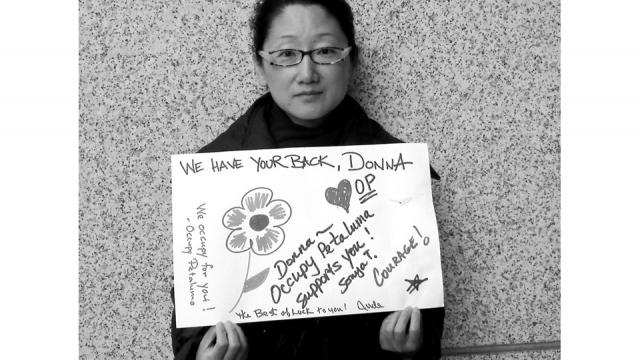
Photo: Occupy the No Justice Zone. Donna Vieira outside Office of the Attorney General in San Francisco.
In 2010, I was not yet ready to fight when my own home in Petaluma, California, was foreclosed by Wells Fargo. I blamed myself and felt a deep sense of shame. I decided to keep the foreclosure a secret from my friends and neighbors. When the Occupy Movement arose in September 2011, I helped to form Occupy Petaluma. I found my voice and was finally able to speak out about my foreclosure.
With the support of my friends in Occupy Petaluma, I learned to fight back against the banks’ systematic crimes against homeowners. At first, it seemed like a losing battle because the banks are so powerful and the government refuses to prosecute their crimes. From the beginning of our work to stop foreclosures, I have often wondered if I was wasting my time. I constantly wrestle with a fundamental question: Can we build a mass movement of homeowners and their advocates to hold the banks accountable for their crimes?
Then I reached a turning point.
Last month I heard about Bay Area resident Donna Vieira, whose home was also foreclosed on by Wells Fargo. She had begun a hunger strike on March 21 to protest the lack of prosecutions for foreclosure fraud. Occupy Petaluma sent a delegation to visit Donna in San Francisco, where she sat outside the California attorney general’s office each weekday. On April 5, she told us that she would have to end her hunger strike for health reasons. I volunteered to start a hunger strike the next day, and to continue for a week, so we could keep the protest going. Soon, other Occupy members around California signed on for additional days, and we hope others throughout the country will join our national chain hunger strike until bank officials are prosecuted for the massive crimes against homeowners.
During my week-long hunger strike I had a lot of time to think about the foreclosure crisis. I reflected on the meaning of the hunger strike in the context of our struggle to build a movement that will hold bank officials accountable for their crimes. The nation’s largest banks have openly admitted to stealing homes through foreclosure fraud in the recent settlement with the Justice Department and states’ attorneys general. But were any bank officials prosecuted for these admitted criminal acts? No. They were only required to pay $2,000 for each home stolen.
In short, the big banks are getting away with foreclosure fraud because the government refuses to prosecute them, and thus they have been given a license to steal our homes and wreck our communities. Analysts say that 20 million homes are in the foreclosure pipeline, and they expect a huge rise in foreclosures in 2012. Since county recorders across the country are reporting continuing high levels of foreclosure fraud by the banks, a large percentage of these foreclosures will be illegal.
It wasn’t always like this. Gretchen Morgenson, a financial columnist at the New York Times, has decried the lack of a single prosecution in the current banking scandal. In 2011 she wrote, “This stands in stark contrast to the failure of many savings and loan institutions in the late 1980s. In the wake of that debacle, special government task forces referred 1,100 cases to prosecutors, resulting in more than 800 bank officials going to jail.”
As activists, we can become overwhelmed by the enormity of the struggle against seemingly insurmountable odds. In our efforts to stop foreclosures and protect our communities, we are often discouraged by the immense power of the banks. They have used their power to corrupt politicians and law enforcement agencies. I’m not talking about outright bribery, but rather the power of hordes of highly-paid lawyers and lobbyists that influence government officials to weaken regulations and block prosecutions. The banks have also used their power to deceive the public, spending billions each year on advertising that depicts the banks as caring and responsible members of society. How can we possibly stand against the power of the banks?
The fact we must face is that our government’s legislative and judicial branches have long since capitulated to the power of the banksters. If we stay the course, millions of more homes are going to be stolen in the coming years by unscrupulous banks reaping enormous profits through foreclosure fraud. We can’t expect justice unless we are willing to fight for it.
And part of that fighting is finding compassion for those who are losing their homes and love for our communities that are being decimated by foreclosures. Is compassion and love enough to defeat the wealth and power of the banks? I believe it is. Compassion and love are what make us human. They give meaning to life. They are the foundation of justice. While the banks practice indifference toward those who are suffering for the crimes those banks committed, it is the officials at those banks who are becoming less and less human every day. Would all the money in the world be able to replace a world turned cold and dark by heartless greed?
The world the banks seek to create with their greed is not one I wish to live in. So I urge everyone who is part of this struggle for justice to ground their thoughts and actions in compassion and love. This is what will sustain and unite us. This is what will create a world worth living in. The hunger strike was a turning point for me in our struggle to stop foreclosures. It helped me understand that nothing can defeat the power of compassion and love.
You can find more information about our national hunger strike on No Justice Zone, Occupy the No Justice Zone and Foreclosure Prevention Zones
3 WAYS TO SHOW YOUR SUPPORT
- Log in to post comments











